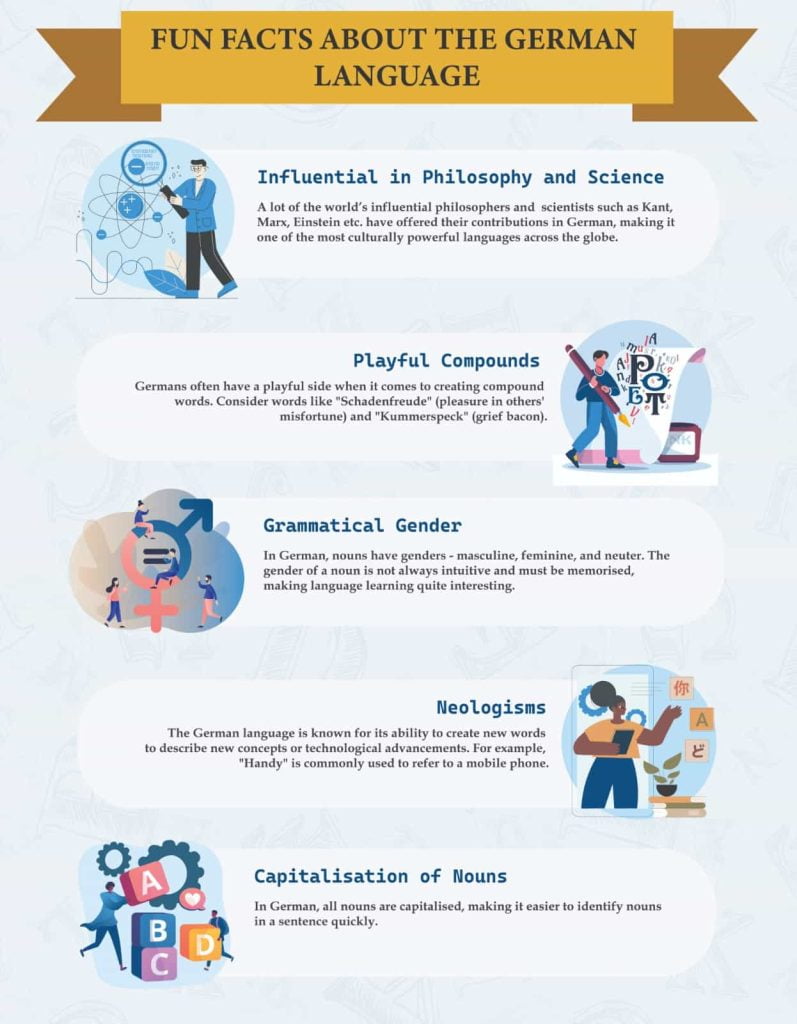
Guten Tag, fellow learners of German!
Whether you’re sipping frothy beer in Bavaria, strolling through Berlin’s historical streets, or simply navigating the enchanting Black Forest, mastering German vocabulary is your key to unlocking the treasures of this linguistically rich and culturally vibrant nation.
For expats, the quest to conquer a new language can be both a thrilling adventure and a formidable challenge. Let’s go on a brief linguistic journey through the heart of Europe, delving into the fascinating world of German vocabulary.
To truly embrace the essence of Deutschland, it’s crucial to immerse oneself in the language and culture. By mastering German vocabulary, you’ll uncover the secrets of a country that thrives on the eloquence of its words, where every conversation is a symphony of expressions and where ordinary life meets what is extraordinary.
Understanding the Basic Structure of German Vocabulary
In your journey towards mastering German vocabulary, it’s imperative to first grasp the foundations of the language. German, like a well-rooted tree, is firmly entrenched in the vast Indo-European family of languages. This linguistic heritage means that it shares some characteristics with other Indo-European languages, but it also possesses its unique and captivating features.
Additionally, here are some key aspects that lay the groundwork for understanding the structure of German vocabulary:
- Indo-European Roots: German is part of the vast Indo-European language family, which includes English, French, and many others. Understanding this linguistic heritage can help you recognize similarities and differences among these languages.
- Compound Words: One distinctive feature of the German language is its penchant for creating compound words, known as “Komposita.” Instead of using separate words to convey a concept, German often combines words into a single, often lengthy term.
- Structural Differences: Unlike English, where word order plays a critical role in conveying meaning, German relies heavily on grammatical cases and word endings. Nouns, pronouns, and articles change form based on their role in a sentence, a concept known as declension. This can be both a challenge and an opportunity for expression.

Essential Tips to Start Mastering German Vocabulary
Unlocking the richness of the German language begins with building a strong vocabulary foundation. Let’s explore some of our favourite tips and strategies to help you efficiently expand your German word bank.
Whether you’re a beginner embarking on your language learning journey or looking to enhance your existing skills, these insights will pave the way for a more fluent and confident command of German vocabulary.
Start with the basics: The most commonly used German words.
Definite and Indefinite Articles:
Learn the German definite articles ‘der’ (the), ‘die’ (the), and ‘das’ (the), along with the indefinite articles ‘ein’ (a/an) and ‘eine’ (a/an). These are essential in structuring sentences and identifying gender.
Pronouns:
Under the difference between personal pronouns such as ‘ich’ (I), ‘du’ (you), ‘er’ (he), ‘sie’ (she), ‘es’ (it), ‘wir’ (we), and ‘sie’ (they). These are frequently used in everyday conversations.
Common Nouns:
Start with basic, high-frequency nouns like ‘Haus’ (house), ‘Auto’ (car), ‘Mensch’ (person), ‘Zeit’ (time), and ‘Arbeit’ (work). These words form the core vocabulary for daily communication.
Numbers:
Learn numbers from 1 to 10, as well as multiples of ten (e.g., 20, 30, 40). Numbers are indispensable for counting, telling time, and expressing quantities.
Question Words:
Familiarise yourself with question words like ‘was’ (what), ‘wer’ (who), ‘wo’ (where), ‘wann’ (when), and ‘warum’ (why). These are essential for forming questions and seeking information.

Building Fluency: The Marathon of the Middle
Building a strong German vocabulary is a crucial step towards fluency. While the basics are always important, we also need to look at some general instructions to kickstart your journey to mastering German vocabulary.
- Consistency is key: Dedicate time each day to learn new words and reinforce what you’ve already learned.
- Use Flashcards: Create flashcards with German words on one side and their English translations on the other. Review them regularly to enhance retention.
- Read Regularly: Read German texts, such as books, newspapers, or online articles. Make note of unfamiliar words and look up their meanings.
- Leverage Language Apps: Language learning apps like Anki, Memrise, and Quizlet offer vocabulary-building exercises and spaced repetition techniques.
- Practice with Native Speakers: Engage in conversations with native German speakers or language exchange partners to apply what you’ve learned and receive real-time feedback.
- Use Mnemonics: Create associations or mnemonic devices to remember challenging words more easily.
- Keep a Vocabulary Journal: Maintain a journal where you record new words, their meanings, and example sentences. Review and revise your journal regularly.

Technology to the Rescue: Best Apps and Tools for Mastering German Vocabulary
With the kind of access we have to the digital space, there is an abundance of online apps and tools designed to make learning German vocabulary engaging and effective. These resources cater to a wide range of learners, from beginners to advanced speakers, offering flexibility and accessibility. Let’s look at a few of our favourites:
Duolingo
Duolingo is a user-friendly app that gamifies language learning. It offers German courses with a focus on vocabulary, grammar, and pronunciation. ‘’
Babbel
This platform provides structured German courses emphasising vocabulary and practical conversational skills. It’s designed for real-world communication, making it a valuable tool for travellers and business professionals.
Memrise
Memrise employs spaced repetition and mnemonic techniques to enhance vocabulary retention. Users can choose from a wide variety of German vocabulary courses created by the community.
Anki
It is a versatile flashcard app that allows users to create custom decks for German words. It employs spaced repetition to help users remember words more effectively
Rosetta Stone
Rosetta Stone’s immersive approach focuses on both vocabulary and pronunciation. The app employs speech recognition technology to help learners speak like a native.
Quizlet
Quizlet is an excellent tool for creating and accessing user-generated flashcards and study sets. There is a plethora of German word sets available for learners to choose from.
Clozemaster
This tool offers context-based learning by presenting German vocabulary in sentences. Learners fill in the missing words to understand words in their natural context.
Tandem
Tandem is a language exchange application connecting you with native speakers. This offers an excellent opportunity to practise German in real conversations
While these are online options, for the more traditional students of German, several higher education language schools have also opened their doors to international students. Make sure to keep an eye out for them.
Dive Deep into Context: Reading and Listening in German
When mastering a foreign language like German, two indispensable skills are reading and listening comprehension. These abilities provide invaluable context, enrich your vocabulary, and enhance your overall language proficiency. Here’s how to dive deep into context through reading and listening:
Developing Reading Comprehension Skills:
- Start Simple: Begin with beginner-level texts, such as children’s books, simple news articles, or language learning books. Gradually progress to more complex materials as you grow comfortable.
- Contextual Clues: Pay attention to the context surrounding words or phrases. Often, the context within a sentence or paragraph can help you decipher unfamiliar vocabulary.
- Annotate and Note: Keep a vocabulary journal or annotate texts. Write down unknown words, their meanings, and example sentences to reinforce your learning.
- Varied Materials: Explore a range of reading materials like books, newspapers, magazines, blogs, and online forums. Each source offers different language nuances and styles.
Upskilling Your German Listening Skills
- Podcasts and Audiobooks: Listen to German podcasts, audiobooks, and radio programs. These expose you to spoken German and various accents.
- Consume German Content: German movies, TV series, and YouTube channels offer real-life language usage and visual context. Enable subtitles to help you follow along.
- Change Up Your Music Taste: Analyse the lyrics of German songs. Music often employs poetic language, and understanding the lyrics can improve vocabulary and cultural understanding.

Using German Vocabulary Regularly
Mastering German vocabulary doesn’t end with learning; the real magic happens when you put your knowledge to practical use. Consistent practice is key to retaining and expanding your word bank. Here’s how to ensure you’re using German words effectively:
- Daily Conversations: Engage in daily conversations with native speakers or language exchange partners. The more you speak, the more your vocabulary will come to life.
- Label Your World: Label items in your environment with their German names. This simple act will constantly reinforce your vocabulary in real-life situations.
- Think in German: Challenge yourself to think in German. Describe your thoughts, plans, and experiences in the language. This mental exercise keeps your vocabulary active.
- Teach Others: Share your knowledge with fellow learners or friends interested in German. Explaining vocabulary and concepts to others reinforces your own understanding.
The Power of Context
Both reading and listening immerse you in the cultural and linguistic context of the German language. Through exposure to varied sources and persistent practice, you can develop a deeper understanding of vocabulary usage, grammar, and idiomatic expressions.
Regularly engaging with these skills will contribute significantly to your German language proficiency and enhance your ability to communicate effectively.
Common German Words To Begin Your Language-Learning Journey
Here are a few very simple and common German vocabulary words to keep in mind as you begin learning the language and navigate your way through the country:
| German Word | Meaning |
| Hallo | Hello |
| Bitte | Please |
| Danke | Thank you |
| Ja | Yes |
| Nein | No |
| Arbeit | Work |
| Stadt | City |
| Haus | House |
| Zeit | Time |
| Geld | Money |
Common Pitfalls While Learning German
Learning German, like any language, can be challenging, and there are common pitfalls that learners often encounter. By being aware of these challenges and knowing how to overcome them, you can make your language learning journey smoother and more effective.
| Common Pitfalls | What Exactly is the Problem? | How to Avoid Them? |
| Overemphasis on Grammar | Some learners get caught up in complex grammar rules, which can be overwhelming and demotivating. | While grammar is important, focus on communication first. You’ll naturally improve your grammar as you progress. Practice speaking and listening to gain fluency. |
| Fear of Speaking | Many learners hesitate to speak due to the fear of making mistakes or sounding awkward. | Embrace your mistakes. They are a natural part of the learning process. Engage in conversations with native speakers or fellow learners to build confidence. |
| Neglecting Listening and Speaking | Some learners primarily focus on reading and writing, neglecting listening and speaking skills. | Listening to podcasts, watching German media, and speaking with others are crucial. They provide context and enhance real-life communication. |
| Vocabulary Overload | Trying to learn too many words at once can be overwhelming and counterproductive. | Prioritize common, everyday words. Practice and reinforce these words in context before moving on to more specialized vocabulary. |
| Avoiding Cultural Context | Language is deeply intertwined with culture. Ignoring cultural aspects can lead to misunderstandings. | Explore German culture, customs, and traditions. This will help you understand language nuances and communicate more effectively. |
| Lack of Consistency | Inconsistent study routines can hinder progress. | Set a regular study schedule and stick to it. Even short, daily sessions are more effective than sporadic, lengthy ones. |
FAQs
- Is it essential to learn German as an expat in Germany?
While not mandatory, learning German significantly enhances your expat experience. It helps you navigate daily life, connect with locals, and opens up job opportunities. Mastering German vocabulary is an excellent first step in your journey.
- What are the best apps for expanding my German vocabulary?
Duolingo, Memrise, and Babbel are popular language learning apps. They offer engaging vocabulary-building exercises and structured lessons. Choose the one that suits your learning style and goals.
- How can I stay motivated while learning German vocabulary?
Answer: Set achievable goals, celebrate small milestones, and create a study schedule. Join language communities, find a language partner, or explore German culture to stay inspired and engaged in your learning journey.
- Are there shortcuts to mastering German vocabulary quickly?
Language learning is a gradual process, but mnemonic techniques, flashcards, and daily practice can expedite your progress. The key is consistency and applying what you’ve learned in real-life situations.
- What’s the importance of context in mastering German vocabulary?
Context is crucial for understanding word usage. Reading and listening to German in context, such as books, movies, and conversations, not only reinforces vocabulary but also aids comprehension and fluency.




